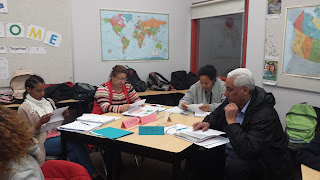Even though they are in different levels, the experience was very meaningful to everybody because they wrote about themselves to a real reader instead of just writing to their teacher. So it was a real world task since many people all over the world still exchange letters with their pen pals or e-pals.
Besides writing the letters, the students also followed instructions and learned how to address an envelope and to use the website of Canada Post to look for the correct postal code. As you can see, all these skills can be transferred to their workplace context.
Before the students wrote their letters, they read one that served as a model. We discussed the characteristics of a letter and checked the parts to be changed by each student according to their stories.
After that, the students wrote a draft of their letters and had a peer correction activity. Then, I checked the letters and they wrote the final version.
When preparing to meet their pen pals face-to-face, they created more complex questions and answers than I expected. For example: S1: Why do you like Canada? S2: It is good. S1: Why is it good? S2: Freedom... I was not expecting this question from a CLB* 1 level student. Maybe this happened because they were really engaged with the task, I think. Or maybe because they were talking about their own lives...
We also discussed about appropriate behaviour in meetings in Canada. We talked about shaking hands and appropriate questions as well.
The face-to-face meeting was an excellent opportunity for all the participants to interact and talk about their lives and experiences. The students enjoyed the moment and were able to practice their listening and speaking skills.
My students were very happy they could understand and interact with students from other classes. They felt proud of themselves and realized they were learning English a lot. Besides having new colleagues at school, they also have another person to practice English with during the breaks. As the results of this project were very beneficial and meaningful to the students, I will continue to provide these kinds of interaction with students from other classes.
Do you encourage your students to have pen pals too?
*CLB - Canadian Language Benchmarks - http://www.language.ca/resourcesexpertise/on-clb/












